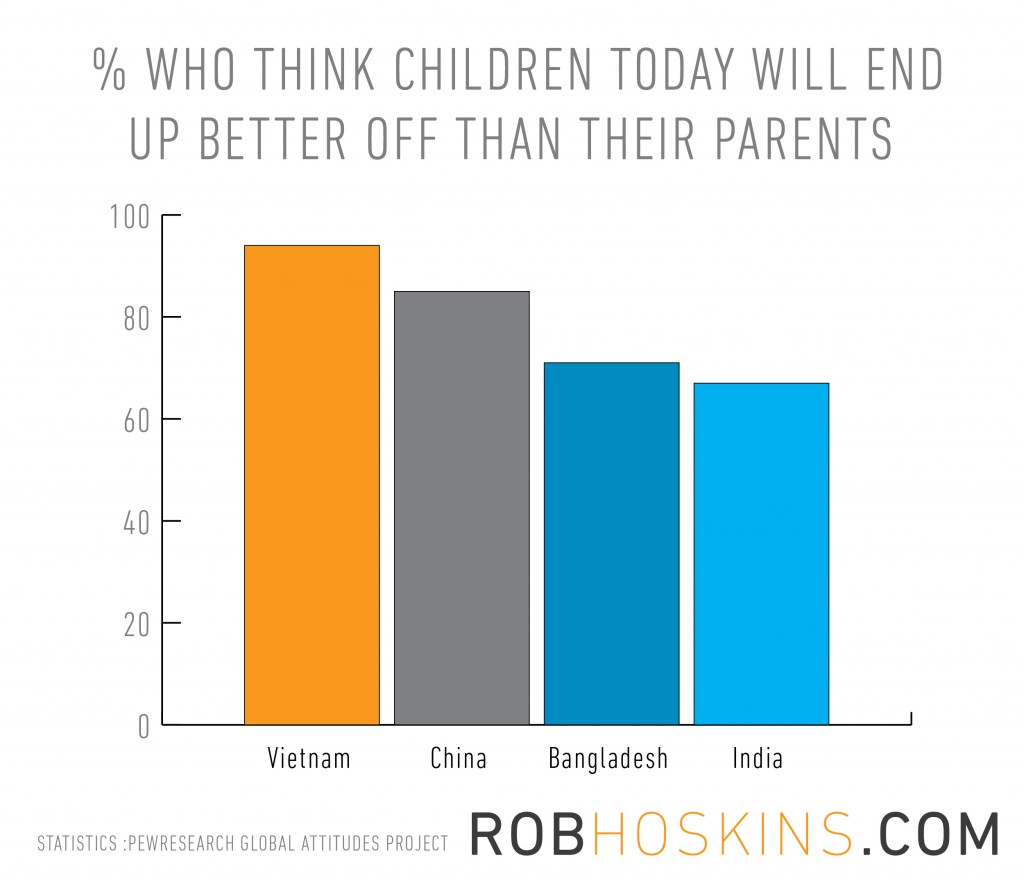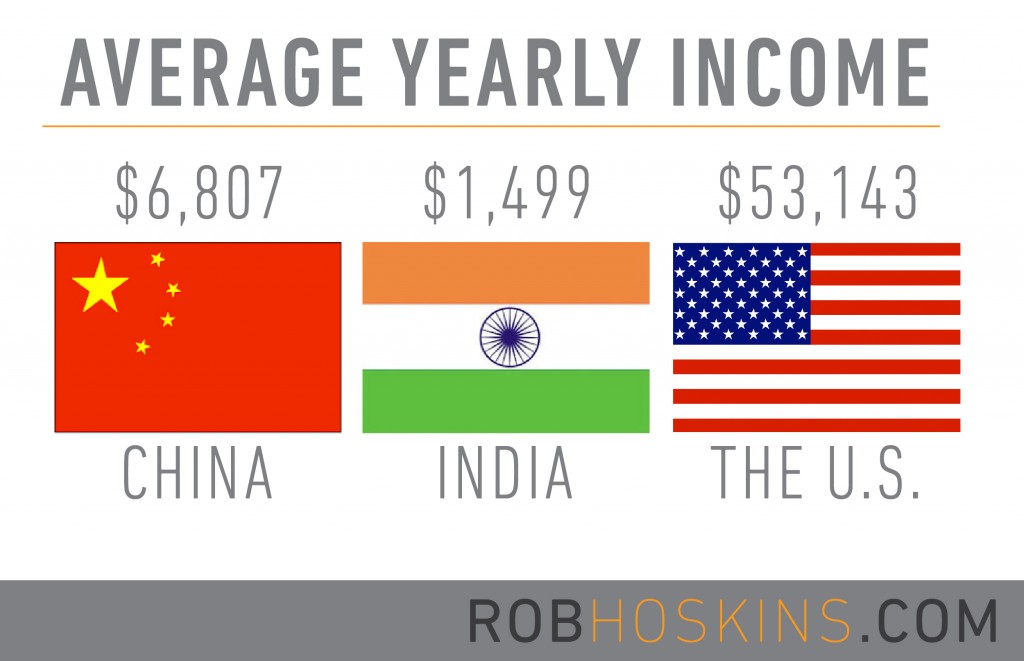Optimism, part 1
I was fascinated by a new global study showing that poorer nations are more optimistic than richer ones. On a pragmatic level, it makes sense. When you are looking up from the bottom of a ladder, of course you can see more potential to climb higher. But I would have thought that resourced nations would view their success and prosperity as a leg up in the optimism department.
Not surprisingly, Americans view themselves as possessing the distinct privilege proffered by our American exceptionalism and strong adherence to a spirit of individualism. As a matter of fact, “Fifty-seven percent of Americans disagree with the statement ‘Success in life is pretty much determined by forces outside our control,’ a considerably higher percentage than the global median of 38%. Similarly, Americans place an especially strong emphasis on the value of hard work–73% think it is very important to work hard in order to get ahead in life, compared with a global median of 50%.”[1]
“[A] Pew survey of more than 48,000 people in 44 countries shows that just 28% of advanced economy respondents believe their children will be better off. A whopping 65% say their kids and grandkids will be worse off. Even though the American economy is improving, the dark clouds of the Great Recession still linger. Just 30% of U.S. respondents were optimistic about the future.”[2]
Why are Americans, such an affluent society, so pessimistic about our future? I think it’s because we’re afraid to admit that we are rich. Many of us not only own a home and a vehicle, but even our vehicle has a home. Imagine explaining how your car lives in a warm, dry garage to one of the 100 million people on the planet[3] whose shelter is nothing more than the night sky. The regionalism of optimism as explained in the study was also intriguing. Asians are particularly optimistic about the next generation’s financial prospects.  Fully 94% of Vietnamese, 85% of Chinese, 71% of Bangladeshis, and 67% of Indians think today’s children will be better off than their parents. Africans and Latin Americans are also on balance optimistic, while Middle Easterners tend to be pessimistic. And in Europe and the United States, pessimism is pervasive.[4] “Although incomes in the USA are down 8% since the financial crisis in 2007, and growth has flattened in advanced economies, standards of living in the world’s richest nations is still better than elsewhere”, says economist Chris Christopher, director of consumer economics at consultancy IHS Global Insight.
Fully 94% of Vietnamese, 85% of Chinese, 71% of Bangladeshis, and 67% of Indians think today’s children will be better off than their parents. Africans and Latin Americans are also on balance optimistic, while Middle Easterners tend to be pessimistic. And in Europe and the United States, pessimism is pervasive.[4] “Although incomes in the USA are down 8% since the financial crisis in 2007, and growth has flattened in advanced economies, standards of living in the world’s richest nations is still better than elsewhere”, says economist Chris Christopher, director of consumer economics at consultancy IHS Global Insight.  The average yearly income is $6,807 per person in China, and $1,499 in India, while in the USA average income is $53,143, according to the World Bank. “On a per capita basis, everyday life, someone in the USA is fundamentally better off than someone in China, but the growth in their income is not going in the right direction,” Christopher said. Positive change “makes people feel a lot better about their opportunity.”[5]
The average yearly income is $6,807 per person in China, and $1,499 in India, while in the USA average income is $53,143, according to the World Bank. “On a per capita basis, everyday life, someone in the USA is fundamentally better off than someone in China, but the growth in their income is not going in the right direction,” Christopher said. Positive change “makes people feel a lot better about their opportunity.”[5]
Happiness Survey Levels of self-reported well-being in fast-growing nations like Indonesia, China and Malaysia now rival those in the U.S., Germany and the United Kingdom—rich nations that have long topped the happiness charts, according to a recent Pew Research Center global survey. The study claims to show how rises in national income are closely linked to personal satisfaction. Probably the most thought-provoking takeaway from the survey was whether or not respondents had each of the following nine items: a television, refrigerator, washing machine, microwave oven, computer, car, bicycle, motorcycle and radio. In findings that were replicated across 37 of the countries, the more items a person had on the list, the happier they tended to be.[6] But the data also suggested that there is a limit to how much happiness money can buy. For example:
- 56% of Malaysians rated their life a “seven” or higher on the ladder
- That’s significantly more than the 36% who did in poorer Bangladesh
- Yet the public in Germany, which has far higher gross domestic product per capita than Malaysia, expressed a life satisfaction level of 60%–just 4 percentage points more than Malaysia.
But despite some of these anomalies highlighted in the report, happiness globally is trending upwards. Fourteen emerging countries highlighted were surveyed in both 2007 and 2014, giving us the ability to compare their data over time. In eight of them, the percentage who say they stand at seven or higher on the “ladder of life” increased by double-digits, with some of the biggest gains occurring in Indonesia, China, Pakistan, Malaysia and Russia.
Consistent with the Macro Trend of the emerging middle class, this data further emphasizes that we must abandon our overly simplistic concepts that missions is “us”—happy wealthy Westerners—saving “them”—the poor, miserable, foreigners. Yes, there are suffering, desperate pockets of individuals around the world. But constantly conveying images of crying, dirty children in our missionary appeals is not only exploitive, it is an overt misrepresentation of the majority of humanity that is actually happier than most Westerners.
You might also enjoy:
- Macro trend: The emerging middle class
- Optimism: Bringing hope for the future
- Hope Delivered: Tiffany’s story



